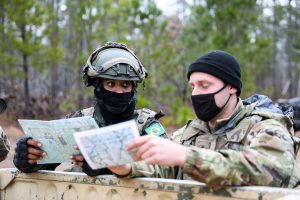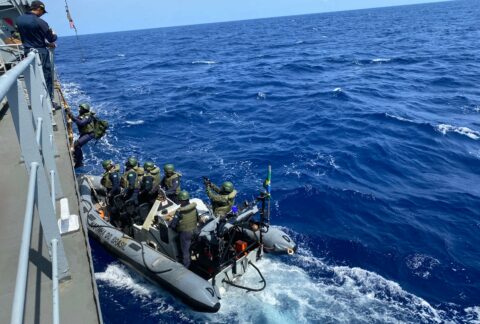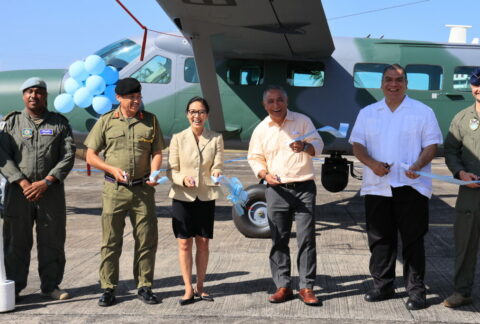An increase in migrants coming across the southern border, threats to the Western Hemisphere by China, and solutions to those and other problems were discussed on March 16 at a U.S. Senate Committee on Armed Services hearing.
U.S. Air Force General Glen D. VanHerck and U.S. Navy Admiral Craig S. Faller testified at the hearing. Gen. VanHerck is the commander of U.S. Northern Command and the North American Aerospace Defense Command; Adm. Faller is the commander of U.S. Southern Command (SOUTHCOM).
“Now more than ever, I feel a sense of urgency about the global threats we face here in our neighborhood. This region is our home. This neighborhood is our home. It’s a shared neighborhood. It’s a hemisphere which is of vital national interest to the United States,” said Adm. Faller.
Now more than ever, I feel a sense of urgency about the global threats we face here in our neighborhood. This region is our home. This neighborhood is our home. It’s a shared neighborhood. It’s a hemisphere which is of vital national interest to the United States,” U.S. Navy Admiral Craig S. Faller, commander of U.S. Southern Command.
The most significant threats facing the hemisphere are China and transnational criminal organizations, he noted.

The Chinese Communist Party, with its insidious and corrupt influence, seeks regional and global economic dominance, in its own version of a rules-based international order, Adm. Faller said.
As evidence, he said China is quickly growing its influence here in the Americas, working on over 40 port deals, dishing out significant loans for political and economic influence, pushing its own information technology structure, and engaging in predatory practices that include illegal, unregulated, and unreported fishing; mining; and logging.
“We have seen many of these tactics in Asia and Africa. We can’t let them prevail here in our neighborhood,” he added.
Transnational criminal organizations pose a direct threat to U.S. national security, Adm. Faller said. They traffic in weapons, humans, and dangerous drugs that claim tens of thousands of lives in America every year.
“These murderous tactics have resulted in 43 of the 50 most violent cities in the world being here in this hemisphere, and they drive illegal migration, and they allow bad actors like China to gain influence,” he said.
Dozens of nations, including Brazil and Colombia have conducted counter-transnational criminal operations and have assigned some of their forces to high-end training in the United States, he said, praising their efforts.
Adm. Faller mentioned that the Drug Enforcement Agency cited Chinese money laundering as the number one underwriter of transnational criminal organizations.
On another topic, Adm. Faller said that the COVID-19 pandemic and two hurricanes have hit this hemisphere hard. According to the International Monetary Fund, the economies of Latin America and the Caribbean shrank 7.4 percent in 2020.
“The impacts of the pandemic, like a perfect storm, will alter the hemisphere for years to come,” Adm. Faller said.
To help alleviate the suffering, SOUTHCOM stepped up humanitarian assistance programs, contributing to over 450 projects in the last year in 28 nations, he said.
“Overall, the United States is the leader in humanitarian assistance in Latin America and the Caribbean,” he said.
SOUTHCOM also works every day to build readiness for its military partners through security cooperation, Adm. Faller said. This includes institutional capacity-building, legal training, education, and exercises.
“We focus on developing professional military forces that know how to fight and use lawful use of military force,” Adm. Faller said, adding that SOUTHCOM also focuses on human rights training, programs to help women, peace and security programs, and noncommissioned officer development.
A modest increase in investments in these programs and intelligence, surveillance, and reconnaissance would be particularly helpful in aiding partner nations, Adm. Faller added, mentioning that SOUTHCOM only receives about 1 percent of DOD’s intelligence, surveillance, and reconnaissance capabilities.
Adm. Faller also praised the U.S. Coast Guard, which has worked alongside the other military services and partner nations in the region.
Later in the day, Adm. Faller and Gen. VanHerck also held a joint Pentagon press briefing, where they spoke on related topics.
Adm. Faller said Cuba, Russia, Iran, and China support a corrupt regime in Venezuela that harbors transnational terrorists. He said multinational efforts should go toward applying pressure on the regime.









